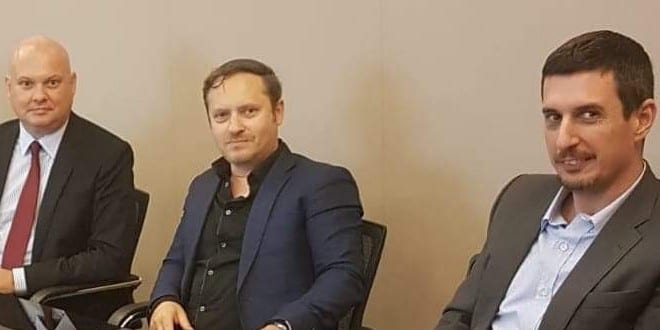On a spot overlooking the Jerusalem Forest, at the Yad Vashem Martyrs’ and Heroes’ Remembrance Authority, is a grove of trees planted in honor of the Righteous Among the Nations – non-Jews who saved Jewish victims of the Holocaust. Among them were about 30 diplomats recognized as such by Yad Vashem, but only two of them were Asian – Chiune Sugihara, of Japan and Dr. Ho Feng-Shan of China.
These courageous East Asian diplomats, who saved thousands of Jews before and during the Holocaust, were commemorated at a recent international workshop which took place at Tamkang University’s College of International Studies in New Taipei City, Taiwan.
Called “Politics of Life, Politics of Light: Humanitarian Diplomacy and Jewish Studies in East Asia,” the workshop was the largest of its kind in Jewish studies ever held in Taiwan. The gathering marked the 33rd anniversary of Chiune Sugihara’s death.
The workshop was co-chaired by Prof. Ber Kotlerman, of the Department of Literature of the Jewish People at Bar-Ilan University (who is currently on sabbatical in East Asia) and Ambassador Fabrizio Bozzato, Sovereign Order of Malta. Participants in the conference came from Israel, Italy, the US, Poland, Belgium, Japan, China and Taiwan and included Sugihara’s son Nobuki Sugihara (of Antwerp) and Ho Feng-Shan’s daughter, Ho Manli (of San Francisco). Both of them spoke about their late fathers.
“When I spoke to my future co-chair here in Taiwan, Ambassador of the Order of Malta Dr. Fabrizio Bozzato, about a workshop of this nature commemorating the East Asian diplomats who were instrumental in saving the lives of Jews during the Holocaust, he was very enthusiastic, for the Order of Malta. [This is because the order], whose history began in Jerusalem hundreds of years ago, is deeply involved in humanitarian efforts in the region and all over the world,” Kotlerman noted.
In November 1939, Chiune Sugihara, a career diplomat, was sent to Kovno (Kaunas), then the capital of Lithuania, to serve as Japan’s Consul. When Lithuania was annexed to the Soviet Union in the summer of 1940, all foreign diplomats were asked to leave Kovno.
As Sugihara was packing his belongings, a Jewish delegation waited in front of his consulate, asking to see him. The delegation was headed by Zerach Warhaftig – a Jewish refugee who later became a religious affairs minister in the Israeli government. Sugihara agreed to meet with the delegation for a brief conversation. The Jewish delegation had come with a desperate request: transit visas.
With these transit visas, they would be able to obtain permission to cross the Soviet Union and head towards the Dutch colony of Curacao, which required no entry visas. “My father didn’t intend to be a hero,” Nobuki Sugihara told workshop participants. Troubled by the refugees’ plight, he began issuing visas at his own initiative, despite being ordered by his ministry not to issue them. Thanks to Sugihara, they were able to leave Europe and escape the murder that began a year later when Nazi Germany invaded Lithuania.
Dr. Ho Feng-Shan, the Chinese Consul-General in Vienna, was given the title of Righteous Among the Nations for his humanitarian courage in issuing Chinese visas to Jews in Vienna despite orders to the contrary from his superior. “My father became one of the first diplomats to help Jews because he was posted to the first place that Nazi Germany took over,” said Dr. Ho’s daughter, Ho Manli.
After the Nazis annexed Austria in 1938, the Jews were subject to a severe reign of terror that resulted in intense pressure to leave the country. In order to do so, the Nazis required that Jews have entry visas or boat tickets to another country.
Unlike his fellow diplomats, Ho issued visas to Shanghai to all requesting them, even to those wishing to travel elsewhere but needing a visa to leave Nazi Germany. Ho refused to carry out the instructions of his superior, the Chinese ambassador in Berlin, who hoped to create closer ties between China and Germany and had forbidden Ho to issue visas on such a large scale, estimated to run into the hundreds, perhaps even thousands.
According to correspondence between the Chinese Embassy in Berlin and its Foreign Ministry in 1939 to 1940, which was recently found by Kotlerman in the Taiwanese National Archives, Dr. Ho “committed lapses in judgment and seems to be unfit for the job. We recommend his demotion to the secretary position…The German Foreign Ministry should not be notified of this.”
Although visas were not required for entrance to Shanghai, such a document was a prerequisite for Jews wishing to leave Nazi Germany. Many of those helped by Ho reached Shanghai, while numerous others used their visas to reach alternate destinations.
The workshop also included papers on the Polish ambassador to Tokyo during WWII Tadeusz Romer, anti-Semitism in Taiwan, geographical “solutions” for Jews in East Asia, the transformation of Confucianism into a “universal Abrahamic religion,” the Jews of Kaifeng and Harbin, the Jewish component of East Asian historiography and more.





